
No. 3, 2024 | 28 February 2024
Go to:
From FRSA’s Chair of the Board

Having been elected Chair of the FRSA Board on 1 December 2023 by the Board Directors was certainly a privilege as I serve my final year on the FRSA Board. It is my intention to be a strong leader and a ‘safe pair of hands’ as the Board settles into a new membership mix with four new people joining the Board of Directors late last year. We are a Board firmly committed to supporting the work of the membership of Family and Relationship Services Australia – through Jackie and her staff at the FRSA national office.
We held our first face to face Board meeting in Canberra last week and this provided us with a great connection to work solidly on progressing the aims and objectives within FRSA’s Strategic Plan. As a newly assembled Board it was important for us to take some time out to do a check in on key Governance principles – to set expectations, responsibilities, and boundaries.
Being in Canberra also afforded us the opportunity to meet with key Departmental stakeholders to discuss with them directly a range of issues we know the sector is working through at the present time. The bulk of those conversations focused on the various review processes underway in the Family and Relationship Services sector – in both AGD and DSS – ensuring the sector has an opportunity to be active participants. We know that the Government is committed to the principles of consultation and collaboration, and we are grateful that we are keenly engaged and at the table in all these conversations.
We also took the opportunity of being together in Canberra to join with the FRSA staff in a full day cultural appreciation training day. We were extremely fortunate to be led by Clinton Scott-Knight from the National Indigenous Training Employment Services (NITES) on this journey. It was moving, emotional and thought-provoking. Clinton also expertly guided us through an activity referred to as Gari Yala (Speak the Truth) developed by Diversity Council Australia which provided the Board and staff with an opportunity to begin to develop ideas giving life to our ongoing commitment to reconciliation and the Uluru Statement of the Heart.
Kind regards,
Teresa Jayet
FRSA Board Chair
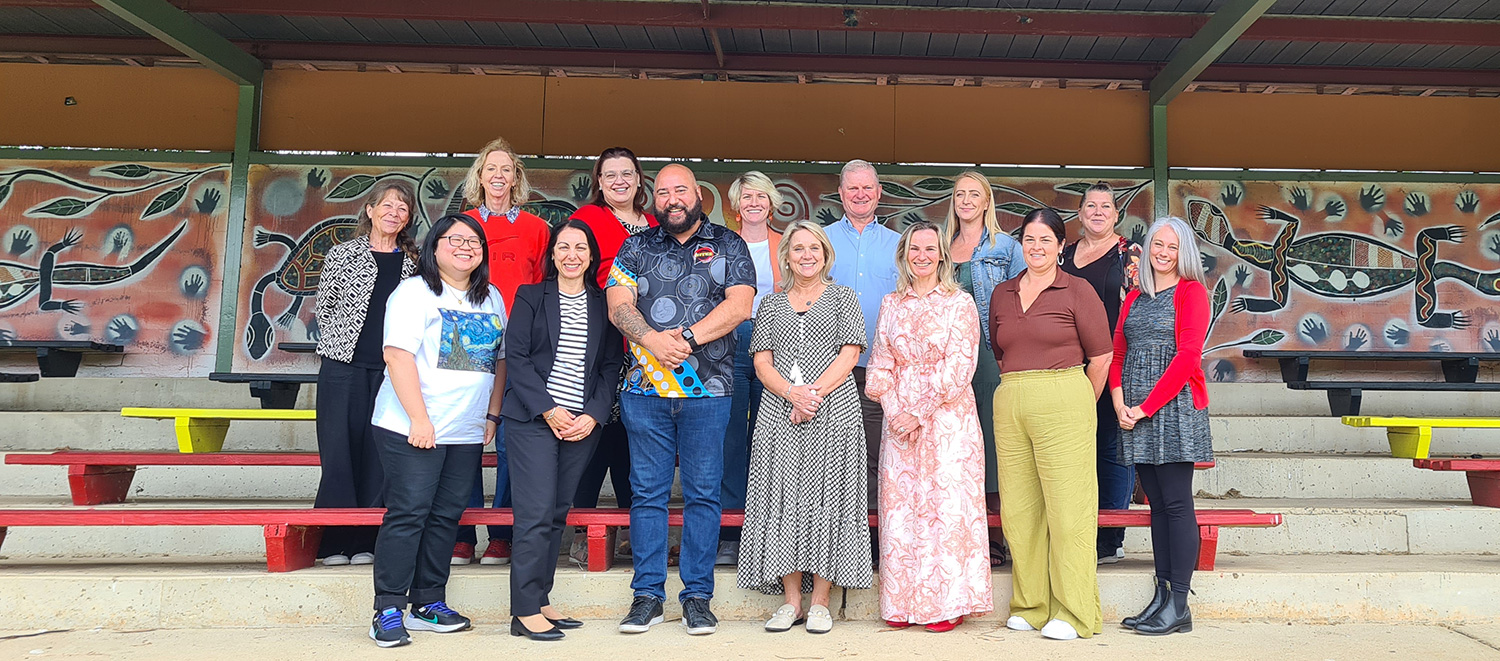
REGISTER FOR EARLY BIRD!
 Don’t miss out on early bird registration rates, which end 4 March 2024. As the sector’s ‘go to’ National, annual event – FRSA will not fail to deliver great speakers, great sessions, great networking and a great venue.
Don’t miss out on early bird registration rates, which end 4 March 2024. As the sector’s ‘go to’ National, annual event – FRSA will not fail to deliver great speakers, great sessions, great networking and a great venue.
Early Bird Registration Fee* Until 4 March 2024
| Member Rates | Non-Member Rates | |
| Complete Conference Experience – Including dinner | $1,095.00 | $1,395.00 |
| Conference Only – No dinner | $1,020.00 | $1,320.00 |
* To be entitled to the early bird registration fee you must have registered and paid by 15 March 2023.
Pre-Conference Workshops – FRSA MEMBERS ONLY
| Member Rates | |
| Dadirri – Ancient Aboriginal Mindfulness Traditions (Aboriginal & Torres Strait Islander Workshop) |
$175.00 |
| Family Law Workshop | $175.00 |
| LGBTIQA+ Family Practice Workshop Presented by Drummond Street Services |
$175.00 |
| Using evidence to paint a picture: Finding opportunities for learning, growth and sharing the success of child and family services Presented by the Australian Institute of Family Studies |
$175.00 |
| Communities for Children Facilitating Partners (CfC FP) Workshop | $175.00 |
Apply for the Bursary Program
FRSA is pleased to offer two bursaries available for Aboriginal and Torres Strait Islander people who are registered for or would like to attend the 2024 Family & Relationship Services Australia National Conference.
Bursaries are provided to assist with covering the cost of conference registration, and travel & accommodation. Each package includes:
- 1 x Complimentary full registration to the Conference (including dinner)
- $500 towards travel and accommodation
To be eligible you must be an employee of a fully financial FRSA member organisation. Applications closes on THURSDAY, 28 March 2024.
Welcome new sponsors!
 We’re thrilled to welcome the following sponsors who will join us in Melbourne for this year’s National Conference.
We’re thrilled to welcome the following sponsors who will join us in Melbourne for this year’s National Conference.
- Anglicare WA as the Family Law Pre-Conference Workshop sponsor
- OurFamilyWizard as an Exhibitor
There are still a number of sponsorship package options available, designed to maximise visibility to showcase the work and activity of your organisation/business. Or if you are interested in a more bespoke package for your organisation don’t hesitate to get in touch with the FRSA team on (02) 6162 1811 or events@frsa.org.au.

FRSA's new Project Officer, Lisa Curtis
 I am originally from New South Wales but have recently re-located from Katherine in the Northern Territory to Canberra with my family. I am really pleased to join the team at FRSA to help to finalise the 12-month Community of Practice (CoP) pilot project.
I am originally from New South Wales but have recently re-located from Katherine in the Northern Territory to Canberra with my family. I am really pleased to join the team at FRSA to help to finalise the 12-month Community of Practice (CoP) pilot project.
The pilot Community of Practice (CoP) sessions are for providers delivering family and relationship services under the Department of Social Services’ Families and Children Activity. The CoP sessions aim to:
- Enable providers to share information, experiences and practice knowledge which will help strengthen knowledge, skills and capabilities.
- Encourage innovative thinking that arises from shared experience and learning.
- Identify shared challenges for providers that may require systematic changes or support.
- Provide a foundation for long-term collaboration between providers to build capability in the sector.
I wanted to work on the CoP pilot project because I am interested in how CoPs connect people who share a common interest and how this connection creates new knowledge and best practice through joint discussions, problem solving, information sharing and relationship building. I have worked in the not-for-profit health and community sector for the last 17 years and can see value in shared learning and how this can influence change.
I am excited to be working with FRSA as they connect with and resource members and communities and provide representation with and on behalf of their member organisations to inform policy development and decision making. I am also looking forward to learning more about the family and relationship services sector and FRSA’s many members. If you see me at the up-and-coming FRSA Conference in Melbourne in May, please come and say hi, I would love to meet you.

PRESENTATION SKILLS WORKSHOP
Wednesday, 13 March 2024
1:00pm – 3:00pm (AEDT)
In the lead up to the FRSA National Conference 2024 in Melbourne in May, FRSA is hosting a Presentation Skills Workshop next month.
Presented by Chris Wagner, Managing Director of Talkforce Media and Communications Strategists, the workshop will provide guidance on how to create an engaging presentation from figuring out your strategy to presentation development and structure.
While this webinar is designed for FRSA Conference speakers, we are opening the invitation to FRSA Members who may be interested in brushing up on their presentation skills. Please feel free to circulate this broadly within your organisation. All staff in our Member Organisations are able to register.
The workshop will be around an hour of theory and then lots of opportunity to ask questions and discuss the content.
Please note this is a FRSA Members only webinar.
Transitioning Child and Family Services to ACCOs – Project underway
Families Australia has been contracted by the Department of Social Services (DSS) to undertake a research project that will explore the potential impact on non-Indigenous organisations when a portion of future child and family services funding will be transferred to Aboriginal Community Controlled Organisations (ACCOs).
The project is linked to the development of a National Child and Family Investment Strategy, which is a key component of Action 2 of the Safe and Supported: Aboriginal and Torres Strait Islander First Action Plan 2023-26. The Strategy will focus on shifting investment to prevention and early supports that address and prevent the underlying social determinants of child abuse and neglect. It will also drive a shift in proportionate investment for child and family services delivered to Aboriginal and Torres Strait Islander people, towards the ACCO sector.
The Families Australia project will:
- identify primary organisational and operational challenges to be faced by mainstream non-Indigenous organisations from the transfer of funding allocations to ACCOs
- identify potential issues concerning future funding sustainability for mainstream non-Indigenous organisations in the child and family services sector.
Activities to support this work will include:
- Multiple face-to-face group consultation sessions across Australia – including in remote/regional settings
- interviews with non-Indigenous providers – large and small – across organisations of differing size, scale and geography
- research and presentation of case studies which highlight the issues faced by non-Indigenous organisations at different stages of transition
- a national online survey
- a desktop review of the jurisdictional plans in each State and Territory for transition arrangements
- development of a comprehensive report with key findings and actionable recommendations for governments.
The final research report – which will be developed in parallel to the National Child and Family Investment Strategy – is due mid-2024.
As yet, there is no publicly available information on in-scope non-Indigenous organisations for the project, but FRSA assumes it includes all organisations delivering programs under the DSS Families and Children Activity (FaC Activity). FRSA members may therefore wish to get involved in the interviews and survey. As far as we are aware, DSS has not formally announced its intention to transition services under the FaC Activity to ACCOs or given notice of timing.
If you would like to find out more about this project please email: policy@familiesaustralia.org.au
Closing the Gap – Study Report released
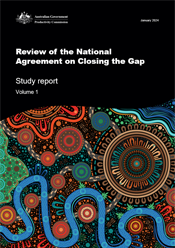 The Productivity Commission’s Review of the National Agreement on Closing the Gap: Study Report was handed to the Joint Council on Closing the Gap on 24 January 2024 and publicly released on 7 February 2024.
The Productivity Commission’s Review of the National Agreement on Closing the Gap: Study Report was handed to the Joint Council on Closing the Gap on 24 January 2024 and publicly released on 7 February 2024.
Disappointingly, the Productivity Commission found that governments have largely not fulfilled their commitments under the National Agreement on Closing the Gap, noting that in the main Governments have simply tweaked ways of doing things rather than implementing true reform. The Commission has therefore made four recommendations to support progress: share power, recognise and support Indigenous Data Sovereignty, fundamentally rethink mainstream government systems and culture, and implement stronger accountability.
The National Agreement on Closing the Gap was agreed in 2020 and builds on:
- existing shared decision-making structures
- the previous National Indigenous Reform Agreement.
The Agreement is ambitious in the scale of change required – it calls for fundamental change in the way governments work with Aboriginal and Torres Strait Islander people.
The review of Closing the Gap involved engagement with Aboriginal and Torres Strait Islander organisations and communities from across the country and a wide range of sectors:
- Reviewers held 235 meetings, including 136 meetings with Aboriginal and Torres Strait Islander organisations.
- 101 submissions were received, including 51 submissions from Aboriginal and Torres Strait Islander organisations.
- Reviewers held 7 virtual roundtables to discuss priority policy areas.
The review report and further information about the review process is available on the Productivity Commission’s website.
HILDA data shows psychological distress rising, loneliness highest amongst young people
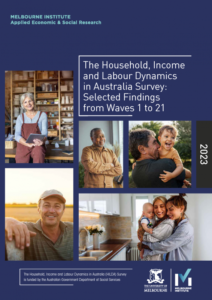 Younger Australians are experiencing higher psychological distress and more loneliness compared to older age groups, according to the latest HILDA data. While distress and loneliness were more common during the pandemic, researchers are concerned about the long-term trends.
Younger Australians are experiencing higher psychological distress and more loneliness compared to older age groups, according to the latest HILDA data. While distress and loneliness were more common during the pandemic, researchers are concerned about the long-term trends.
The 18th edition of the annual Household, Income and Labour Dynamics in Australia (HILDA) report examines data gathered between 2001 and 2021, by tracking over 17,000 people in over 9,000 households.
This edition also includes insights into vaping and e-cigarette use for the first time and the second year of the COVID-19 pandemic.
Key findings include:
Loneliness highest amongst young people
Between 2001 and 2009, the greatest proportion of lonely people was among those aged 65 and older. However, by 2021, this group contained the lowest proportion of lonely individuals of all age groups with the 15-24 age group now the highest. All other age groups had a lower proportion of lonely people in 2021 than in 2001.
Psychological distress rising
Psychological distress levels decline with age, with the youngest age groups (15-24) reporting the highest average distress scores in 2021. Almost half (42.3 per cent) of people aged 15-24 were psychologically distressed in 2021, up from 18.4 per cent in 2011.
Between 2007 and 2021, the percentage of women who were psychologically distressed was higher than men. For men, the prevalence of psychological distress increased by roughly 51 per cent over this period, whereas among women the prevalence of distress increased by about 63 per cent.
Marriage on the decline but partnered couples do better financially
There has been a decline in the proportion of married people, which is mirrored by growth in de facto relationships between 2001 and 2021. For men, the proportion of those married declined from 56.3 per cent in 2001 to 50.3 per cent, while the proportion in a de facto relationship rose from 9 per cent to 14.7 per cent.
For women, the proportion of those married declined from 54.5 per cent to 48.2 per cent, while those in a de facto relationship rose from 8.9 per cent to 14.3 per cent.
New National Commissioner for Aboriginal and Torres Strait Islander children
 Last week, as part of the government’s response to the latest Closing the Gap report, Prime Minister Anthony Albanese announced that a new position of National Commissioner for Aboriginal and Torres Strait Islander children and young people will be created this year.
Last week, as part of the government’s response to the latest Closing the Gap report, Prime Minister Anthony Albanese announced that a new position of National Commissioner for Aboriginal and Torres Strait Islander children and young people will be created this year.
“The National Commissioner will be dedicated to protecting and promoting the rights, interests and wellbeing of First Nations children and young people, as well as calling on their strengths, sense of hope, and ideas for change,” he said.
“The Commissioner will address the unacceptable rates of out-of-home care. What it all comes down to is strengthening families and keeping children safe.”
SNAICC CEO, Catherine Liddle welcomed the creation of the role calling it a game changer to help address Closing the Gap targets.
“Our sector and our communities have been calling for a National Commissioner for Aboriginal and Torres Strait Islander children for many years, to tackle the over-representation of young people in out-of-home care and youth detention,” Ms Liddle said.
“The National Commissioner will be the champion, the voice and facilitator for our children, young people and families, and who will hold governments to account.
FRSA welcomes the announcement and looks forward to the announcement of the new Commissioner.

New Race and Age Discrimination Commissioners announced

The Australian Human Rights Commission has announced the appointment of two new Commissioners – Giri Sivaraman as the new Race Discrimination Commissioner, and Robert Fitzgerald AM as the new Age Discrimination Commissioner.
Mr Sivaraman is currently the Chair of Multicultural Australia, and a Principal Lawyer at Maurice Blackburn where he is head of the firm’s Queensland Employment law department. He will join the Commission on Monday 4 March.

Mr Fitzgerald has been the NSW Ageing and Disability Commissioner since 2019, and was previously an Australian Productivity Commissioner. He will start in the new role on Tuesday 2 April.

Communicare Leads Family Domestic Violence Response Team Initiative
 A new initiative to strengthen earlier intervention with men who choose to use violence will be trialled in five locations across Western Australia.
A new initiative to strengthen earlier intervention with men who choose to use violence will be trialled in five locations across Western Australia.
Communicare has been awarded the project, which is part of the $3.3 million in funding being provided to the Western Australian Government under the Australian Government’s Innovative Perpetrator Responses initiative.
The Family Domestic Violence Response Team (FDVRT) initiative will trial a program to evaluate pro-active engagement with men who have used violence, following notification from police that they have been called to an incident of family and domestic violence.
Communicare will be rolling-out early intervention response services across five locations in Bunbury, Northam, Joondalup, Midland and Fremantle over the next three years. They will provide interventions and individual sessions based on the perpetrator’s use of violence and patterns of offending, offering tools and strategies to support them to make positive changes in their lives.
Communicare CEO, Melissa Perry said, “This initiative will play a significant role in helping us to further support the safety of women and children by addressing the attitudes and power imbalances that allow men’s violence to exist.” Read more.
Loneliness by Numbers: A South Australian Snapshot
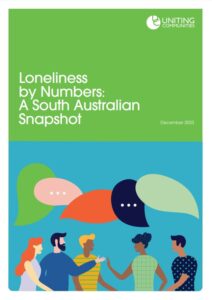 Last month Uniting Communities released a report that explores and defines loneliness, who may be affected and how we can overcome it. It presents data from South Australians reporting their experiences of loneliness, lack of companionship, feelings of being left out or isolated.
Last month Uniting Communities released a report that explores and defines loneliness, who may be affected and how we can overcome it. It presents data from South Australians reporting their experiences of loneliness, lack of companionship, feelings of being left out or isolated.
The data revealed that:
- South Australians are reporting their highest rates of loneliness since March 2020
- 97% of people aged between 25-29 experienced loneliness often or sometimes
- 91% of people aged between 18-24 experienced loneliness often or sometimes
- South Australians located in regional areas reported higher levels of isolation than those in metropolitan Adelaide.

Community Child Care Fund Open Competitive Round 4
This grant opportunity is available to Child Care Subsidy (CCS) approved services that meet eligibility criteria in the Grant Opportunity Guidelines.
The intended outcomes of the grant opportunity are to support:
- Early childhood education and care (ECEC) services operating in under-served disadvantaged and vulnerable communities to be able to address (or have increased capacity to address) community level barriers to child participation in early childhood services
- increased number of children from vulnerable or disadvantaged families and communities accessing ECEC
- viability of ECEC services operating in disadvantaged communities, including in areas with fluctuating and/or low short-term demand
- increased availability of ECEC places in disadvantaged communities with high unmet demand.
The grant opportunity will provide funding for two key activities:
- Sustainability Support: helping eligible ECEC services improve the viability and financial sustainability of their service, including working with other organisations and families to identify and address community level barriers to early childhood participation. Community level engagement must ultimately result in increased access and participation.
- Capital Support: helping eligible ECEC services by contributing towards the cost of minor to moderate capital works, including repairing, modifying, renovating or extending existing ECEC facilities (‘capital works’). These capital works must result in more ECEC places in areas where there is unmet demand.
Applications close at 9pm AEDT on 8 March 2024. Click here to find out more or apply.
2024 NAIDOC week theme - 'Keep the fire burning! Blak, loud and proud'
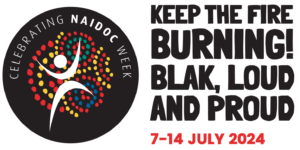 Held across the country from 7-14 July 2024, NAIDOC Week will celebrate and recognise the history, culture and achievements of Aboriginal and Torres Strait Islander peoples.
Held across the country from 7-14 July 2024, NAIDOC Week will celebrate and recognise the history, culture and achievements of Aboriginal and Torres Strait Islander peoples.
This year’s theme chosen by the National NAIDOC Committee, is Keep the Fire Burning! Blak, Loud & Proud.
The theme honours the enduring strength and vitality of First Nations culture – with fire a symbol of connection to Country, to each other, and to the rich tapestry of traditions that define Aboriginal and Torres Strait Islander peoples.
International Women's Day 2024
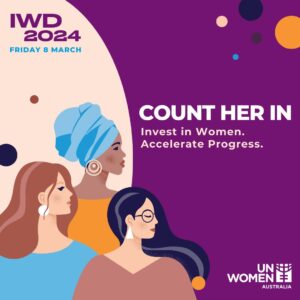 International Women’s Day is on 8 March 2024. This year’s theme is Count Her In: Invest in Women. Accelerate Progress. Based on the priority theme for the United Nations 68th Commission on the Status of Women, Count Her In will examine the pathways to greater economic inclusion for women and girls everywhere.
International Women’s Day is on 8 March 2024. This year’s theme is Count Her In: Invest in Women. Accelerate Progress. Based on the priority theme for the United Nations 68th Commission on the Status of Women, Count Her In will examine the pathways to greater economic inclusion for women and girls everywhere.
International Women’s Day is a global day celebrating the social, economic, cultural and political achievements of women. The day also marks a call to action for accelerating gender parity. Significant activity is witnessed worldwide as groups come together to celebrate women’s achievements or rally for women’s equality.
SUNSHINE CIRCLES – Albury
SUNSHINE CIRCLES – Shepparton
HEY LITTLE WARRIOR – Sale
Webinar: How developmental evaluation can be used to develop and adapt social service programs | Relationships Australia Victoria and the Australian Institute of Family Studies | Wednesday 13 March 2024, 1:00 – 1:30PM (AEDT).
This webinar will explore how Relationships Australia Victoria used developmental evaluation to adapt their Men’s Behaviour Change Program (MBCP) to online delivery during the COVID-19 pandemic.
Relationships Australia Victoria’s Lead Evaluator, Sandra Opoku, will discuss how and why she used developmental evaluation with the MBCP, the results of the evaluation and what she learned along the way.
This webinar will give you:
- an understanding of how to design and implement a developmental evaluation
- insight into what evidence a developmental evaluation can generate
- an understanding of what developmental evaluation can and can’t be used for.
This webinar will be of interest to practitioners, managers and evaluators working in child and family services.
VIC
Family Dispute Resolution Practitioner | Relationships Australia Victoria
WA
Family Dispute Resolution Practitioner – Broome | AnglicareWA
Family Dispute Resolution Practitioner – Karratha | AnglicareWA
NT
headspace Clinical Operations Manager | Anglicare NT
headspace Registered Nurse | Anglicare NT
Eating Disorder Coordinator | Anglicare NT
Director Partnership Support Services | Anglicare NT
Counsellor (Family and Relationships Services) | Relationships Australia Northern Territory
Counsellor / Community Engagement Officer Redress Scheme Support Service | Relationships Australia Northern Territory
If you have any events you’d like listed on the FRSA Events and Training Calendar or job vacancies you’d like listed on the FRSA Jobs Board, email Communications Officer, Vanessa Lam at communications@frsa.org.au. Please note that posting onto the FRSA website is reserved for FRSA Members only.

Best interests and targeting: implementing the Privacy Act Review to advance children’s rights | Reset Australia
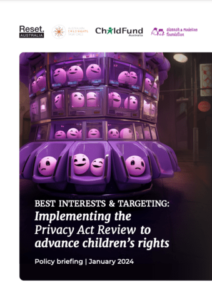 This paper explores ‘targeting’ from a child rights framework, identifying some of the more common ways targeting – as defined in the 2022 Privacy Act Review – interacts with children’s rights.
This paper explores ‘targeting’ from a child rights framework, identifying some of the more common ways targeting – as defined in the 2022 Privacy Act Review – interacts with children’s rights.
Alternative reporting options for sexual assault: perspectives of victim-survivors | Australian Institute of Criminology
 This report examines victim-survivors’ knowledge of and experiences using alternative reporting options.
This report examines victim-survivors’ knowledge of and experiences using alternative reporting options.
Prevalence of Diverse Genders and Sexualities in Australia and Associations With Five Forms of Child Maltreatment and Multi-type Maltreatment | Institute of Child Protection Studies
This study presents the most comprehensive national prevalence estimates of diverse gender and sexuality identities in Australians, and the associations with five separate types of child maltreatment and their overlap (multi-type maltreatment). Using Australian Child Maltreatment Study (ACMS) data (N = 8503), 9.5% of participants identified with a diverse sexuality and .9% with a diverse gender. Diverse identities were more prevalent in the youth cohort, with 17.7% of 16–24 years olds identifying with a diverse sexuality and 2.3% with a diverse gender.
How police body-worn cameras can facilitate misidentification in domestic and family violence responses | Australian Institute of Criminology
Police body-worn camera (BWC) technologies—affixed to a vest, sunglasses or cap—are deployed by all Australian police agencies, including in frontline responses to domestic and family violence (DFV). This paper presents the findings from the first Australian study focused on how women DFV victim-survivors view and experience BWC technology in police call-outs and legal proceedings. Informed by a national survey of 119 victim-survivors, it explores two key concerns relating to the potential consequences of BWC footage, including that it may facilitate misidentification of the primary aggressor, and that perpetrators may use the BWC to present (false) evidence of themselves as blameless.
Scoping project for the National Child and Family Investment Strategy: final report | Australian Human Rights Commission
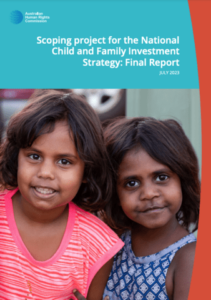 In this report, the National Children’s Commissioner makes 18 recommendations about how the National Child and Family Investment Strategy should work.
In this report, the National Children’s Commissioner makes 18 recommendations about how the National Child and Family Investment Strategy should work.
Made to feel different: Families perspectives on external responses to autism and the impacts on family well-being and relationships | Institute of Child Protection Studies
This study aimed to investigate the impact of external factors on the experiences and family relationships of autistic adolescents and their families. A qualitative approach was used, with in-depth interviews conducted with 30 participants, including autistic adolescents, siblings and parents from within families with an autistic adolescent family member. The findings suggest that external factors significantly influence the well-being of autistic adolescents and their families. The school environment was identified as a significant factor, with sensory overload, bullying and adverse interactions with teachers having a negative impact on the mental health and quality of family relationships for participants.
Gendered housing matters: toward gender-responsive data and policy making | Australian Housing and Urban Research Institute
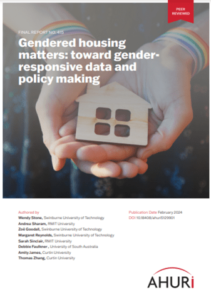 This research seeks to inform improved housing and homelessness responses to gendered housing experiences, and to explicitly broaden the ways to conceptualise and engage with gender in housing policy, research, and data collection and analysis.
This research seeks to inform improved housing and homelessness responses to gendered housing experiences, and to explicitly broaden the ways to conceptualise and engage with gender in housing policy, research, and data collection and analysis.
8 tips to help your child manage back-to-school anxiety | Emerging Minds
Emerging Minds Families has developed eight tips for parents and carers to help their school anxiety and reduce its impact on their mental health, learning and wellbeing. We encourage you to share this with families who may need some additional support at this time of year.
Factors, dynamics and effects of isolation for older people: an exploratory study – final report | Australian Institute of Family Studies
 This study provides empirical data on the experiences of isolated older Australians living in New South Wales and the effects of social and geographical isolation on these older people. It also provides empirical data on how service providers across New South Wales identify isolated older people and facilitate their access to supports and services.
This study provides empirical data on the experiences of isolated older Australians living in New South Wales and the effects of social and geographical isolation on these older people. It also provides empirical data on how service providers across New South Wales identify isolated older people and facilitate their access to supports and services.
The reading guarantee: how to give every child the best chance of success | Grattan Institute
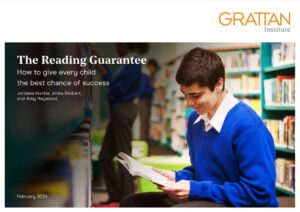 A fundamental promise of an education system is that almost every child who goes to school will learn how to read. This report outlines evidence showing about one in three Australian school students are not mastering the reading skills they need.
A fundamental promise of an education system is that almost every child who goes to school will learn how to read. This report outlines evidence showing about one in three Australian school students are not mastering the reading skills they need.
Barriers and enablers to the multigenerational workforce | ARC Centre of Excellence in Population Ageing Research
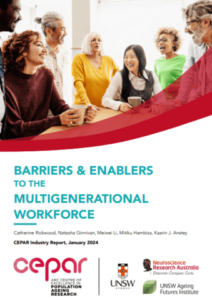 Australia’s population is ageing with life expectancy amongst the highest in the world. This research contributes to a small but growing body of literature on ageing in the workplace.
Australia’s population is ageing with life expectancy amongst the highest in the world. This research contributes to a small but growing body of literature on ageing in the workplace.
Police responses to intimate partner violence incidents involving children: Exploring variations in actions and concerns in an Australian jurisdiction | Child Abuse & Neglect
This study investigates how police officers’ responses vary depending on the nature and severity of IPV incidents and explores disparities in their responses when children are present at Intimate Partner Violence incidents.
Want to submit something to the FRSA eBulletin?
If you have an news item or event that you would like to be featured in a future eBulletin please submit your announcement via the form below or email communications@frsa.org.au with the subject “FRSA eBulletin submission”.
Please note FRSA members receive priority for items posted in the eBulletin. And to keep information current, relevant and useful, submissions will not be repeated from week to week.
Subscribe
Subscribe to receive future eBulletin editions directly to your inbox!








